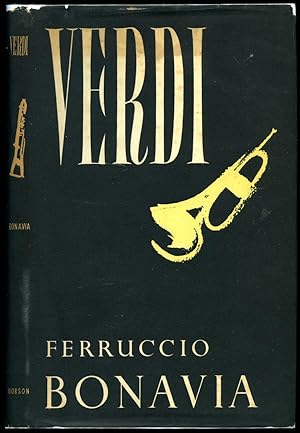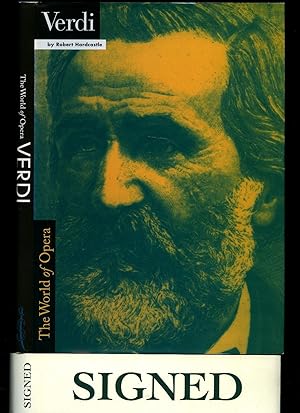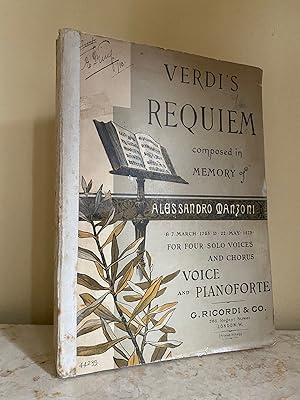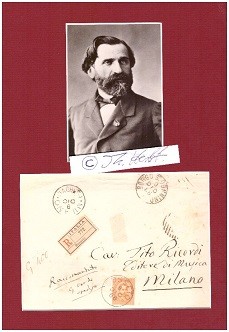Verdi, Giuseppe, Italian Composer 1813 1901 (14 results)
FeedbackSearch filters
Product Type
- All Product Types
- Books (6)
- Magazines & Periodicals (No further results match this refinement)
- Comics (No further results match this refinement)
- Sheet Music (1)
- Art, Prints & Posters (No further results match this refinement)
- Photographs (No further results match this refinement)
- Maps (No further results match this refinement)
- Manuscripts & Paper Collectibles (7)
Condition Learn more
- New (No further results match this refinement)
- As New, Fine or Near Fine (No further results match this refinement)
- Very Good or Good (5)
- Fair or Poor (No further results match this refinement)
- As Described (9)
Binding
- All Bindings
- Hardcover (2)
- Softcover (No further results match this refinement)
Collectible Attributes
Language (1)
Free Shipping
- Free Shipping to United Kingdom (No further results match this refinement)
Seller Location
Seller Rating
-
Verdi
Published by Published by Dennis Dobson Limited, 12 Park Place, St. James's Street, London First Thus . 1947., 1947
Seller: Little Stour Books PBFA Member, Canterbury, United Kingdom
Association Member: PBFA
First Dennis Dobson edition hard back binding in publisher's original green cloth covers, gilt title and author lettering to the spine. 8vo. 9'' x 5½''. Contains [vi] 120 printed pages of text with five monochrome illustrations. Very Good condition book in Very Good condition dust wrapper with small rubs to the top front corner and top of spine, not price clipped 8s 6d. Dust wrapper supplied in archive acetate film protection, it does not adhere to the book or to the dust wrapper. Member of the P.B.F.A. OPERA.
-
I Lombardi | Opera Programme | Performed 4th November 1957 | Welsh National Opera Company
Published by Welsh National Opera Company Monday 4th November . 1957., 1957
Seller: Little Stour Books PBFA Member, Canterbury, United Kingdom
Association Member: PBFA
Folded white paper programme. 8vo. 8¼'' x 5¼''. Contains double sided printed programme. In Very Good condition. Member of the P.B.F.A. OPERA.
-
Verdi (The World of Opera Series) Signed
Published by Published by Spellmount Ltd., The Old Rectory, Staplehurst, Kent First Edition . 1996., 1996
Seller: Little Stour Books PBFA Member, Canterbury, United Kingdom
Association Member: PBFA
First Edition Signed
First edition hard back binding in publisher's original black cloth covers, gilt title and author lettering to the spine. 8vo. 10'' x 7''. Contains 160 printed pages of text with archive monochrome illustrations and photographs throughout. Fine condition book in Fine condition dust wrapper, not price clipped. SIGNED by the author to the front free end paper 'To Ray - With every good wish, Bob Hardcastle, June 1996.' Dust wrapper supplied in archive acetate film protection. Member of the P.B.F.A. ISBN 1873376618 MUSIC [Classical].
-
Albumen cabinet card, after an earlier portrait.
Published by Friedrich Bruckmann. -1898 Photographer, 1814
Seller: Bristow & Garland, Shaftesbury, United Kingdom
One of the series of portraits in the "Bruckmann's Collection". ca. 1870. 6 1/2 x 4 1/4 inches. Tiny chip out of upper edge of plate else fine.Postage will be reduced to actual cost when we process your order.
-
Boosey's Musical Cabinet | Vocal Series No. 3: Verdi's Operatic Songs with Italian and English Words [Vintage Piano Solo Sheet Music]
Published by Published by Boosey & Co. 295 Regent Street, London | 9 East Seventeenth Street, New York circa . 1870., 1870
Seller: Little Stour Books PBFA Member, Canterbury, United Kingdom
Association Member: PBFA
Sheet Music
Vintage piano sheet music in stitched illustrated blue card covers. 10¾'' x 8½''. Contains 62 pp + the covers. Scored for the pianoforte and voice with lyrics with Italian and English Words. Foxing to the end papers and page edges, else in Very Good condition. Member of the P.B.F.A. SHEET MUSIC.
-
Verdi's Requiem | Composed in Memory of Alessandro Manzoni for Four Solo Voices and Chorus The English Translation by C. L. Kenney | Voice and Pianoforte | G. Ricordi & Co. Number 44235
Published by Published by G. Ricordi & Co. 265 Regent Street, London not dated circa ., 1890
Seller: Little Stour Books PBFA Member, Canterbury, United Kingdom
Association Member: PBFA
Publisher's original colour illustrated card wrap covers [soft back], white linen tape down the spine. 4to. 11'' x 8''. Contains full-page monochrome frontispiece of Verdi, (vi), 218 pp. Rubbing to the covers, ink name to the top left hand corner of the front cover, some red tick marks to the score, else in Very Good condition. Member of the P.B.F.A. MUSIC [Classical].
-
Autograph letter signed.
Published by Genoa, 8. IV. 1871., 1871
Seller: Antiquariat INLIBRIS Gilhofer Nfg. GmbH, Vienna, A, Austria
Manuscript / Paper Collectible
£ 3,742.86
Convert currency£ 25.96 shipping from Austria to United KingdomQuantity: 1 available
Add to basket8vo. 2¼ pp. on bifolium. Written in ink. To Count Opprandino Arrivabene (1807-87), writing in the aftermath of "La semaine sanglante" which marked the suppression of the Paris Commune in 1871. Arrivabene was Verdi's close friend, and appears to have been in Paris for the events of Spring 1871 while Verdi was in Florence; the tone of the letter is nonetheless light to start. He wishes his friend a good Easter, and hopes to confess the acts of impatience committed while Verdi was in Florence ("Buona Pasqua; e vatti a confessare almeno tutte gli atti d'impazienza commesi nel tempo che io sono a Firenze"). Verdi exclaims, "io peccato abbastanza? Povero arrivabene!", and explains that "Mazzucato è stato qui ieri, e abbiamo lavorato ancora al Regolamento." Mazzucato was likely Alberto Mazzucato (1813-77), who had retired from composition after his last opera, "Hernani", but who evidently remained involved with fellow composers of his day. - Business having been discussed, Verdi turns to the news of the Paris Commune: Why did Arrivabene not say anything about France? It could have been much worse! "Ben peggio del 93! Allora si trattava d'acquistare e rassodare una libertà che non avevano ancora avuto; en non avevano sofferto tanti desastri, nè avevano un nemico in casa!". One day, Verdi tells his friend, one will not be able to believe such infamy ("questa nefandità"). - Gently creased at folds; ink has faintly bled through. Date of letter pencilled onto blank final page in modern hand.
-
Autograph letter signed.
Published by Sant'Agata in Villanova sull'Arda, 28. XII. 1873., 1873
Seller: Antiquariat INLIBRIS Gilhofer Nfg. GmbH, Vienna, A, Austria
Manuscript / Paper Collectible
£ 4,010.20
Convert currency£ 25.96 shipping from Austria to United KingdomQuantity: 1 available
Add to basket8vo. 1 p., with accompanying envelope. Written in ink. Verdi, hard at work on a composition, writes to Count Opprandino Arrivabene, "Io holavorato tutt'oggi alla messa", but that he wishes to "sospendo un momento per augurarti Salute, Buona amore", etc. The mass Verdi is composing in December 1873 may well be his Messa da Requiem, composed in memory of Alessandro Manzoni who had died that spring, and which would be first performed in May 1874. - Opprandino Arrivabene (1807-87) and Verdi were lifelong friends, and kept up a warm correspondence on subjects of music, politics, and private life. - Letter gently creased along folds, envelope lightly soiled with its date noted in pencil in a modern hand.
-
Autograph letter signed.
Published by Florence, 13. III. 1871., 1871
Seller: Antiquariat INLIBRIS Gilhofer Nfg. GmbH, Vienna, A, Austria
Manuscript / Paper Collectible
£ 2,673.47
Convert currency£ 25.96 shipping from Austria to United KingdomQuantity: 1 available
Add to basket8vo. 2 pp. on bifolium. To an "Illustre Signore" who has requested his aid in weighing the skill of a fellow composer. However, Verdi does not know the gentleman in question ("Non conosco il sig. Maestro Mercuri") and thus cannot pass judgement on him: instead, he suggests it would be better to have a contest in order to find a satisfactory answer. Verdi goes on to say that he is happy that these circumstances have given him the advantage of corresponding with a person who greatly honours Italy and science ("una persona, che onora tanto l'Italia e la scienza"), and he dares to hope that he will be forgiven for not having been able to answer more satisfactorily the question he was asked. - The maestro in question was likely Agostino Mercuri (1839-92) who wrote several operas. His son later claimed in a biography of Mercuri that his father was familiar with many great musical names of his age, including Verdi, but perhaps this was an exaggeration, or refers to a later acquaintance after Mercuri wrote his most famous opera, "Adelinda", the year following this letter. - Gently creased along folds; subtle paper repair to small closed tear.
-
Autigraph letter signed ("G. Verdi").
Published by Genoa, 1. IV. 1883., 1883
Seller: Antiquariat INLIBRIS Gilhofer Nfg. GmbH, Vienna, A, Austria
Manuscript / Paper Collectible
£ 5,792.52
Convert currency£ 25.96 shipping from Austria to United KingdomQuantity: 1 available
Add to basket8vo. 3 pp. on bifolium. To the pianist and composer Ferdinand von Hiller (1811-85) concerning an invitation to the Lower Rhenish Music Festival and rumours about the composition of "Otello". Verdi assumes that it was Hiller who sent him the festival programme and thanks him warmly for it but declines an invitation to participate due to the distance, his age, and lack of time: "Voi potete immaginare quanto piacere ne avrei a potervi assistere; ma voi capite altresì che io sono tanto lontano, che ho molti anni che pegano e rendono difficili i viaggi, e che anche il tempo mi manca". He will think of him during the festival, which will "bring back happy memories of joyful hours in your company", and asks Hiller to inform him about the "surely excellent result" upon its conclusion. After a few words about the weather and his plans to go to the countryside, Verdi goes on to deny rumours that might have reached Hiller about having written "Otello": "Caso mai aveste sentito dire che io st. facendo qualche cosa, o che io abbia terminato un Iago, un Otello et ca, non credete niente. Io non ha fatto nulla, assolutamente nulla" ("If you heard that I am doing something, or that I have finished an Iago, an Otello etc., do not believe anything. I have not done anything. Absolutely nothing"). - While Verdi only started composing "Otello" in early 1884, he had first seen Arrigo Boito's draft for the libretto in the summer of 1881, commented on it, and appears to have been intrigued. Verdi's reluctance and secrecy are due to his official retirement after the success of "Aida" in 1871 and his fear of adverse criticism of what might be his last work. When "Otello" finally premiered in Milan on 5 February 1887, it proved a resounding success. - In 1877, Verdi had followed Ferdinand von Hiller's invitation to conduct his "Messa da Requiem" at the 54th Lower Rhenish Music Festival in Cologne. Hiller retired from the directorate of the Gürzenich Orchestra Cologne and the organisation of the Lower Rhenish Music Festival in 1884; he did not live to see the premiere of "Otello". - Traces of folds. Some yellowing to the first page.
-
Autograph letter signed.
Published by No place, 2 Nov., no year.
Seller: Antiquariat INLIBRIS Gilhofer Nfg. GmbH, Vienna, A, Austria
Manuscript / Paper Collectible
£ 2,138.78
Convert currency£ 25.96 shipping from Austria to United KingdomQuantity: 1 available
Add to basket8vo. ½ page on bifolium. With autograph address on verso. To his French publisher Léon Escudier (1821-81), regretting his being unable to visit him, but asking him to come to his place instead, as he has several things to tell him: "Son de plato di non poter venire da voi; ed avrei pure tante cose a dirvi. Fatemi dunque l'estremo favore di venire da me verse le 12 ore []". - With former collector's number "98" in pencil. Traces of former mounting on reverse; address leaf with two marginal tears.
-
8 autograph calling cards, one holograph envelope, and one telegram.
Published by No place, no date and [1878]., 1878
Seller: Antiquariat INLIBRIS Gilhofer Nfg. GmbH, Vienna, A, Austria
Manuscript / Paper Collectible
£ 6,683.67
Convert currency£ 25.96 shipping from Austria to United KingdomQuantity: 1 available
Add to basketAltogether 9 ff. and envelope. All addressed to Count Andrea Zorzi, an eccentric Venetian nobleman from an ancient family and a supporter of Verdi; he is said to have owned a silver cane upon which the titles of each Verdi opera were engraved as he heard them. Most items with a short sentence or two: "ringrazio e contraccambio auguri di gran cuore". - Condition varies: some are browned; the telegram is chipped with some loss and toning.
-
Autograph letter signed ("G. Verdi").
Published by Milano, 18 Nov. 1845., 1845
Seller: Antiquariat INLIBRIS Gilhofer Nfg. GmbH, Vienna, A, Austria
Manuscript / Paper Collectible
£ 6,683.67
Convert currency£ 25.96 shipping from Austria to United KingdomQuantity: 1 available
Add to basket8vo. 1½ pp. Bifolium with integral address panel. In Italian, to Léon Escudier, the French publisher of Giuseppe Verdi's works: "I have received almost contemporaneously your very much valued letters. Lucca has assured me that you would have the preference of the Opera of London, and that this affair shall be definitively concluded when I and Lucca in April shall pass through Paris to go to London. As to the Opera, it suffices that you sustain me. I want to advise you that in the Carnival of 1847 I must write an Opera for L. which shall be performed in Rome, thus I could not make in that period another Opera. For the present we must suspend this business, and the case wh shall speak of it when I shall be in Paris. Give me news of Ernania [.]" (transl.). - Traces of folds; small tear on f. 2. Formerly the property of a private Chicago-area collector.
-
GIUSEPPE VERDI (1813-1901) italienischer Komponist der Romantik, der vor allem durch seine Opern, darunter Rigoletto, Otello und Falstaff, berühmt wurde / italian romantic composer
Seller: Herbst-Auktionen, Detmold, Germany
Signed
£ 757.48
Convert currency£ 5.62 shipping from Germany to United KingdomQuantity: 1 available
Add to basketE.ORIGINAL-BRIEFUMSCHLAG (mit Briefmarke, Poststempeln, Einschreibemarke, qu. kl. 8°, 12 x 16 cm, leicht beschnitten) in Tinte mit Adresse, eigenhändigem Absendervermerk, kleiner eigenhändiger Unterschrift signiert Busseto, 8.XII.1886 - an "Cav: Tito Ricordi / Editore di Musica / Milano - Raccomandato G. VERDI spedito" - mit s/w-Fotopostkarte (Porträt von Gaspard Nadar) unter bordeauxrotem Passepartout (1 S. 4°) gerahmt.






![Seller image for Boosey's Musical Cabinet | Vocal Series No. 3: Verdi's Operatic Songs with Italian and English Words [Vintage Piano Solo Sheet Music] for sale by Little Stour Books PBFA Member](https://pictures.abebooks.com/inventory/md/md31822040932.jpg)








